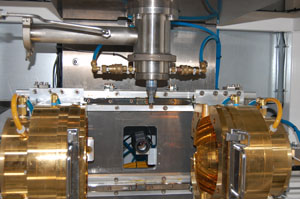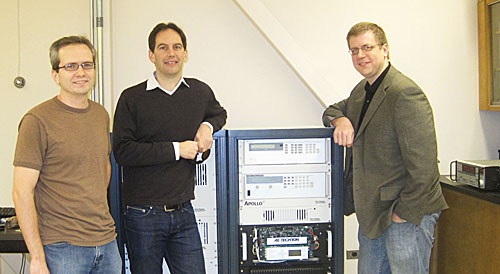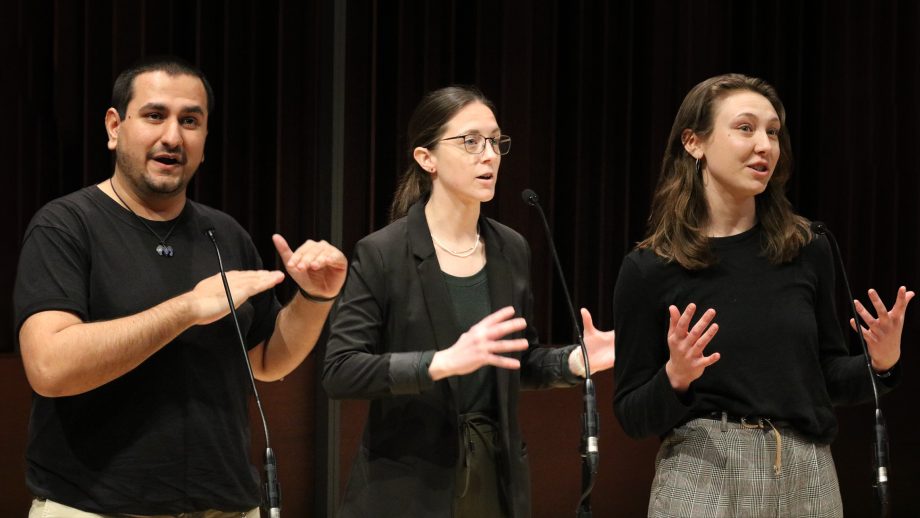WINNIPEG, MB – Three University of Winnipeg professors engaged in cutting-edge scientific research have received prestigious grants from The Canada Foundation for Innovation totaling $554,248, it was announced today.
Dr. Christopher Wiebe (Chemistry) receives $398,396 for establishing the Prairie Research Institute for Materials and Energy (PRIME). PRIME is a new crystal growth and materials characterization facility. The central focus is a floating zone image furnace – a device used to grow large, high-purity single crystals of various materials that have applications as new energy storage devices, new superconductors and other technological spin-offs. PRIME is also equipped with a powerful 9 Tesla magnet and a series of probes that can measure the properties of materials to nearly absolute zero in temperature. Only a handful of facilities in North America have these resources available in one central location for exploring new compounds. PRIME is a collaboration involving an interdisciplinary team of researchers at the University of Winnipeg, University of Manitoba, Brandon University and the University of Saskatchewan.

Inside an image furnace. A video camera is built into the instrument, as seen in the middle of the photo, so the scientist can record the crystal as it grows.
Dr. Jeffery Martin and Dr. Christopher Bidinosti (Physics) receive $155,852 to develop the Polarized Xenon Laboratory for Fundamental Physics. This new facility will be used to produce nuclear polarized xenon gas for physics research using atoms and neutrons. The experimental techniques developed in this laboratory will allow high precision measurements on neutrons and other particles that directly inform our knowledge of the fundamental nature of the universe. A direct spin-off of its technology will be the development of advanced methods of medical imaging.
“There has never been a better time to study science at UWinnipeg,” said Dr. Lloyd Axworthy, UWinnipeg President and Vice-Chancellor. “As we prepare to move into our state-of-the-art Richardson College for the Environment and Science Complex in the next few months, we are attracting top-caliber researchers like Professors Bidinosti, Martin and Wiebe, leaders in their field who involve our students in tremendously interesting and relevant scientific projects.”
“Chris Wiebe, Jeff Martin and Chris Bidinosti are among the finest researchers at The University of Winnipeg,” said Dr. Rod Hanley, UWinnipeg Dean of Science. “Their success in obtaining these CFI grants displays the growing importance of science research at UWinnipeg. We are all proud of their accomplishment.”
The CFI today announced a total of $61,291,274 in new funds to support 246 projects at 48 institutions across Canada.
“The investments being announced today at The University of Winnipeg will further enhance our country’s reputation as a destination of choice for outstanding researchers,” said Dr. Gilles G. Patry, President and CEO of the CFI. “They will make our universities even more competitive when it comes to attracting the best and brightest researchers from around the world.”
BACKGROUNDER
Dr. Christopher Wiebe received his B.Sc. in Chemistry and Physics from the University of Winnipeg in 1996 and a PhD from McMaster University in 2002. He was an NSERC postdoctoral fellow at Columbia University from 2002-2004, an assistant professor at Brock University from 2004-2005, and an assistant professor at the Florida State University/NHMFL from 2005-2009 before returning to Department of Chemistry at the University of Winnipeg in 2009.
Dr. Wiebe’s research interests include the synthesis and characterization of new magnetic materials, and the investigation of these materials using x-ray scattering, neutron scattering, and muon spin relaxation techniques. He is also involved in the promotion of Canadian neutron science, the design of future beamlines at reactors and accelerators, and collaborations with scientists around the world in the pursuit of novel functional materials.
Many current problems in materials science, from the design of cleaner forms of energy, storing information, and building better infrastructure for our cities can be addressed with the discovery of new materials and their investigation using neutron beams. With this CFI award, PRIME establishes a local cluster of instruments that will enable future discoveries of new materials that will directly affect our way of life.
Dr. Jeff Martin received his B.Sc. in Honor’s Physics from the University of Manitoba in 1995 and a PhD in experimental nuclear physics from the Massachusetts Institute of Technology in 2000. He was a postdoctoral fellow at the California Institute of Technology from 1999-2004 before joining The University of Winnipeg in 2004.
His area of specialization is experimental particle physics, and he has worked on such diverse projects as the production of ultracold neutrons at Los Alamos, NM and determining fundamental properties of the proton at Jefferson Lab in Newport News, VA. As well as holding a Natural Sciences Engineering and Research Council (NSERC) Discovery Grant, he received Canada Foundation for Innovation (CFI) funding for establishment of a detector lab based at the University.
He will also be leading the design, construction, and operation of an ultracold neutron source at TRIUMF at the University of British Columbia, in collaboration with the Japan Society for the Promotion of Science. This facility, which when completed will provide the highest density of ultracold neutrons in the world, was recently awarded $4.225-million in CFI funding.
Dr. Christopher Bidinosti received his B.Sc. in Physics from Brandon University in 1993 and his Ph.D. from the University of British Columbia in 2000. He was a postdoctoral fellow at l’Ecole Normale Superieure (Paris) and Simon Fraser University before joining The University of Winnipeg in 2007.
Dr. Bidinosti develops new techniques of nuclear magnetic resonance, with a wide variety of applications ranging from fundamental physics to medical imaging. He holds an NSERC Discovery Grant and received CFI funding in 2009 to establish one of the few laboratories in the world exploring the combined use of hyperpolarized gases and ultra-sensitive detectors known as Superconducting Quantum Interference Devices. This approach offers many advantages over conventional magnetic resonance techniques. Most notably, Dr. Bidinosti’s work will be used for high precision studies of neutron physics as well as for new imaging methods of lung physiology and disease.
With this CFI award, Drs. Martin and Bidinosti will combine their expertise to establish a new laboratory dedicated to the study of fundamental physics by making use of the unique properties of xenon gas. In particular, the experimental techniques developed in this lab will be used to make precise measurements of the properties of particles such neutrons. This will provide new information about the nature of the universe and will help direct the development of theories of fundamental physics. The new laboratory will also have a direct impact on the further development of innovative medical imaging techniques taking place at The University of Winnipeg.
The Canada Foundation for Innovation (CFI) is an independent corporation created by the Government of Canada to fund research infrastructure. The CFI’s mandate is to strengthen the capacity of Canadian universities, colleges, research hospitals, and non-profit research institutions to carry out world-class research and technology development that benefits Canadians. Since its creation in 1997, the CFI has committed $5.3-billion in support of more than 6,800 projects at 131 research institutions in 65 municipalities across Canada. www.innovation.ca.
– 30 –
MEDIA CONTACTS
Diane Poulin, Communications Officer, The University of Winnipeg
P: 204.988.7135, E: d.poulin@uwinnipeg.ca
Yves Melanson, Coordinator, Media Relations, Canada Foundation for Innovation
Tel.: 613-996-3160, Cell.: 613-447-1723, yves.melanson@innovation.ca





